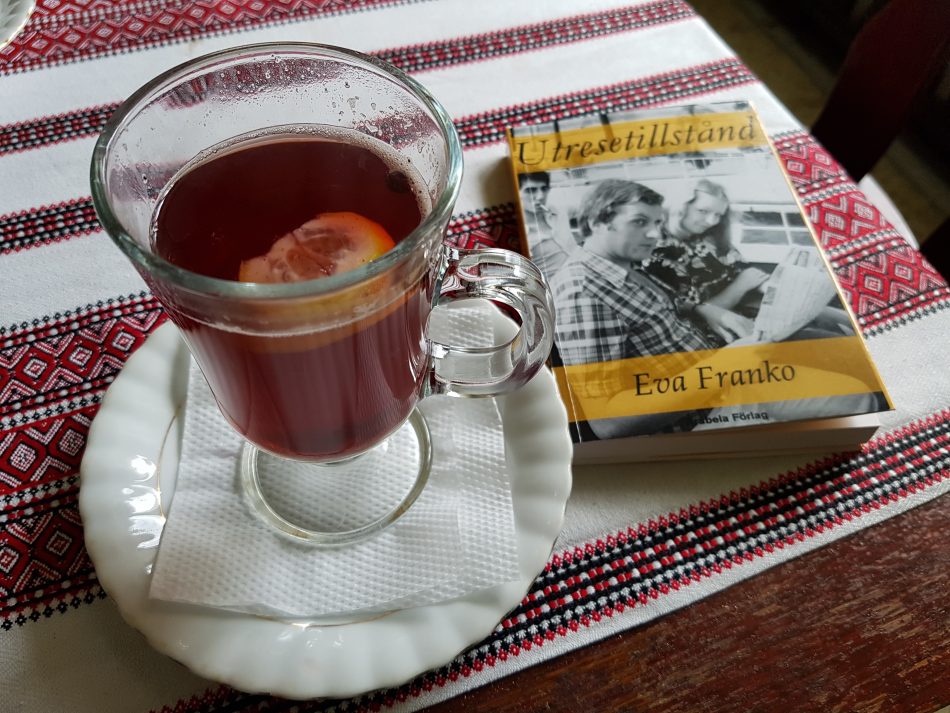Om Eva Frankos “Utresetillstånd”
Category: 1989, bokrecension, by sophie engström, eastern europe, krönika, literature
Tags: Eva Franko, revolution, Slovakien, Tjeckoslovakien
Det händer något med oss när vi är med om stora samhällsförändringar. Ofta beskriver vi det som om samhället förändrades, och vi står vid sidan om och ser på. När jag läser Eva Frankos Utresetillstånd blir jag varse hur fel den perceptionen är. Vi står inte utanför, oavsett var vi befinner oss. När samhället gungar, förskjuts vår identitet. Vår själsliga kropp ändrar form.
I Utresetillstånd färdas vi genom Katarina Levitskys liv, från hennes tillvaro i Stockholm till barndomens Slovakien, då del av Tjeckoslovakien. Vi får genom den unga Katarinas ögon läsa hur det kommunistiska samhället fungerar. Gradvis förstår hon att hon lever i ett förtryck, att det finns andra bortom hennes tillvaro som har en större frihet. Genom kvinnorna hon ser omkring sig ser hon också hur samhället fungerar, det är deras ansikten som tar oss fram till en tid då muren raseras. En mur som finns både fysiskt i tillvaron, men också i den vuxna Katarinas inre.
Hon befinner sig i Stockholm och ser på håll hur folket ger sig ut på gatorna i Prag i det som skulle kallas Sammetsrevolutionen 1989. En revolution som ledde till att diktaturen störtas. Det här ledde sedermera till att Katarinas hemstad blev en del av det nya självständigare Slovakien.
Samtidigt som jag färdas genom Utresetillstånd, läser jag Stefan Zwiegs Världen av igår. Det är två mycket olika böcker, men det finns ändå beröringspunkter. Båda skriver om en svunnen tid, andra epoker som de av olika anledningar måste brottas med. För mig är de epoker jag inte känner genom mitt inre utan just via andras berättelser. Jag tror att jag fångas upp mer av Eva Frankos berättelse då hon låter oss färdas genom kvinnorna. Det är dessutom namn jag kan relatera till. Zwiegs värld består för mig av ansikts- och ordlösa män. De flesta av de namn Zwieg nämner känner jag inte till. Det får mig att känna mig obildad och dum. Franko fyller sin berättelse med namn jag känner till, och med kvinnor. Det får mig att känna mig delaktig och (märkligt nog) sedd.
Jag har själv levt genom en revolution, och jag kan därför identifiera mig med Katarina Levitskys resa och transformation. Man förändras på så många vis. Man förändras i hur man ser på andra, på myndigheter, på allt som omger oss. Den här förändringen speglar sig i hur man ser på sig själv. Om man lever i en omgivning som inte förstår vad det innebär att genomströmmas av en revolution, blir det lätt så att man värjer sig från kontakt. Det kan vara svårt att beskriva vad man genomgår. Det här hände mig när jag kom till Sverige efter Euromajdan. Jag uppfattade de jag mötte som ointresserade och ibland arroganta. Jag hade ju upplevt något som jag aldrig trodde jag skulle uppleva, och aldrig hade jag varit så rädd. Allt i mitt liv sattes ur spel under de där månaderna. Det var därför svårt att acceptera att många inte intresserade sig för mina upplevelser. Kanske var det därför som jag kände mig så lycklig när jag återvände till Ukraina, efter sommaren i Sverige. Och det är här jag känner den verkliga beröringspunkten med Eva Frankos berättelse, och jag känner mig tacksam över att få läsa om någon som också känt den där typen av speciella utanförskap.




